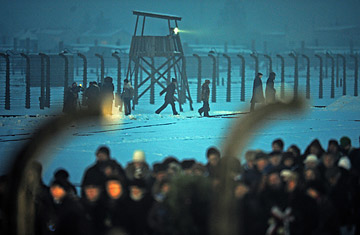
People arrive on Jan. 27, 2010, to attend ceremonies marking the 65th anniversary of the liberation of the Auschwitz-Birkenau Nazi death camp
Alberto Israel still remembers the date he arrived at the Auschwitz concentration camp: Aug. 3, 1944. He and his family had just been transported to Nazi-occupied Poland from their home on the Italian-occupied island of Rhodes in the Mediterranean — a 14-day journey by boat and by train in a stifling cattle car. "We knew it was an abattoir when we arrived. We could smell the melting flesh," he recalls during a return visit to the death camp 65 years later, his eyes welling up with tears. "We got there at 10 in the morning, and by 2 in the afternoon, my mother and father had been gassed."
Now 82, Israel was one of a handful of survivors who joined dignitaries like Israeli Prime Minister Benjamin Netanyahu on Wednesday for an emotionally charged ceremony to mark the camp's liberation on Jan. 27, 1945, a date now commemorated as International Holocaust Remembrance Day. "It's hard to explain how I feel," Israel says. "I feel stress all over, my body shuts down, and I want to leave. But I must come back."
An estimated 1.1 million people died at the camp — the vast majority of them Jews from occupied Europe. Most were killed in gas chambers. They accounted for about one-sixth of all the Jews exterminated during the Holocaust. Speaking to some 1,500 people gathered in a tent near one of the railroad tracks used to bring prisoners to the camp, Netanyahu described the genocide as "the greatest crime of humanity" and "the greatest tragedy in Jewish history."
Israel, who now lives in Brussels, has been back to Auschwitz five or six times over the years, often acting as a tour guide for other visitors. But he says the visits always fill him with dread. "Every trip is painful. Even last night, I couldn't sleep. I finally got out of bed at 4 a.m., had a coffee and tried to read," he says. When I am alone, I still cry." The memories are as real as one physical reminder: he rolls up his sleeve to reveal the identification tattoo on his forearm, "B-7394."
Inside the camp, Israel ambles through the thick snow with no gloves on a 2°F day, pointing to the sparse bunker where he slept crammed together with other prisoners on tiny bunks. Then, next to the railroad tracks, he spots the location where the "selection" process took place. This was where Nazi officers separated those deemed able to work from the other new arrivals, most of whom were immediately taken to the gas chambers. Israel, then 17, and his two brothers, Eli and Aaron, last saw their parents here. Within weeks, Israel's brothers would also be dead.
Israel says he survived in part because he learned German on the spot at Auschwitz. "It probably saved my life," he says. "If you didn't understand the SS and the Kapos [the prisoners who supervised work gangs] when they gave orders, then you risked death." During his time there, Israel worked in the coal mines around Auschwitz.
When the Soviet Red Army liberated the camp, only a few thousand prisoners remained. Just a week earlier, Nazi officials had evacuated the facility, destroyed the camp's records and blown up the gas chambers. Most of the prisoners, some 60,000 of them, were then sent on a death march to other camps as their Nazi guards fled the Soviet advance. Israel was one of the marchers. He says they walked for about 60 miles in temperatures dipping to –10°F until they reached the town of Wodzislaw Slaski in southern Poland. "We only had our thin prison clothes and broken shoes. If you wanted a warm drink, you had to drink your urine," he recounts. From there, he was sent by train to the Mauthausen concentration camp in Austria, where he stayed for four months until it was liberated by the U.S. Army in May 1945. When he was finally freed, Israel weighed a mere 64 lb. He gained 17 lb. after only a week in the Americans' care.
When he recovered, Israel didn't want to return to Rhodes. Before the war, the island — now part of Greece — had a vibrant, 1,700-strong Sephardic Jewish community, but afterward, only 151 remained. So he found work as a trader in the Belgian Congo instead and then moved to Brussels, where he has remained ever since.
As he leaves the camp on Wednesday, dusk is falling and the light from candles flickers on the snow. Looking back at the desolate, snow-covered compound, Israel winces. "We have to remember, always," he says. "But it's never easy."
